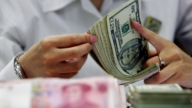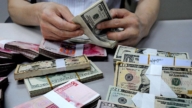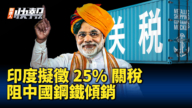【新唐人2014年06月04日訊】5月是中國樓市銷售的傳統旺季,在業內素有「紅五月」之稱。不過今年5月的「百城價格指數」顯示,中國一百座城市的房價,兩年來首次出現環比下跌,超過六成的城市房價下跌。而一線城市的北京樓市,也在量價齊跌中「收官」。人們擔憂的中國房地產「拐點」真的來了嗎?請看以下報導。
「中國指數研究院」5月31號發佈的「百城價格指數」顯示,今年5月份全中國100個城市的住宅,平均價格為每平米10978元,環比下跌了0.32%,這是自2012年6月以來,連續環比上漲23個月後,首次開始下跌。
從漲跌城市數量來看,62個城市環比下跌,比4月份增加了17個,其中跌幅在1%以上的有30個,比上月也增加了14個。
北京、上海等十大城市的住宅均價為每平米19605元,環比下跌0.18%,8大城市環比下跌。
《新唐人》特約經濟評論員馬傑森表示,中國樓市現在改變了過去十幾年連續上漲的趨勢,大家的共識是:「房價必然會下行。」
《新唐人》特約經濟評論員馬傑森:「在價格上、銷量上各方面跡象都顯示出,實際上出現拐點了。就是它從增長很可能變成不漲,有些地區甚至會出現下跌,個別地區已經出現了暴跌。」
馬傑森表示,中國房地產的泡沫也不平均,像北京、上海這樣的一線城市,樓市需求量大,價格下跌不會那麼太快;但是三線、四線城市,就會出現懸崖式的下跌。
據《中原地產》監測,中國有21個大中城市,近一個月的新開樓盤認購率,都在45%以下,而去年的新開樓盤認購率為56%﹔截至5月中旬,中國20大標竿房企銷售額為2414億元,僅是去年全年銷售額的28.3%。
而作為房地產市場龍頭的北京也不樂觀:5月份北京樓市新建商品房環比4月銷售,減少了12.4%,如果剔除保障房,則比去年同期下降了23.5%。北京的二手房銷售環比則下降了9.02%,並創下了自2009年以來交易量的新低,價格環比也下跌5.55%。
不過,更令人擔心的是,截至5月底,北京商品房的庫存量達到了77058套,近3個月就增加了22000套。
鑒於房地產現狀,在過去兩個多月,中共陸續出臺宏觀政策,不僅加大「微刺激」力度,還進一步放開,採取了包括「滬港通」試點方案、出臺10個省市地方政府債券自發自還的試點方法﹔以及鼓勵社會資本參與基礎設施投資等一系列措施。
北京《國情內參》首席研究員鞏勝利:「這輪調整可能是中國經濟36年改革開放以來最麻煩的一次,一個是它的貨幣供應量最大了;還有一個是美國的QE,10月份要結束了,國際上的貨幣開始收縮了;還有一個是中國經濟的速度開始下降了。」
北京《國情內參》首席研究員鞏勝利指出,過去胡、溫當政的10年中,中國的經濟從數據上增長了230多倍,但它裡面有太多的泡沫和水份,所以,中國的經濟品質在G20國家中是最差的。所以,調整勢在必行,這也是中共歷史上一個最大的挑戰。
公開資料顯示,去年中國經濟增長7.7%,但房地產投資就佔到了GDP的15%以上。房地產也在去年對中國經濟的貢獻超過了20%,土地收入佔到了地方財政70%的份額。另外,房地產行業去年融資高達12萬2000億人民幣,也佔全國融資額的70%以上。
鞏勝利認為,今年中國房地產至少下滑20%。
鞏勝利指出,如果今年房地產下滑超過30%,中國就會爆發經濟危機,因為房地產耗費和佔用了中國太多的貨幣和資本。中國一旦爆發經濟危機,還會衝擊到其他國家。
5月15號,「中國農業銀行」首席經濟學家向松祚在「2014中國金融論壇」上警告說,中國發生系統性、全域性金融危機的可能性已經超過60%,甚至可能超過70%!
採訪/陳漢 編輯/宋風 後製/葛雷
Turning Point? Housing Prices in a Hundred Cities
Dropped in May
May is the traditional peak season of China’s property market,
referred to as “Red May” in the sector.
But the “100 Cities Price Index” shows that housing prices in
one hundred cities dropped for the first time in two years in
May 2014, with price drops in over 60% of the cities.
Beijing’s property market also dropped in volume and price.
Has the feared China Real Estate bubble bursting point arrived?
The 100 Cities Price Index by China Index Research Institute
released on May 31 shows that the average price of residential
estate across 100 cities in China was 10,978 yuan per square
meter, down by 0.32% month on month, andyear on year.
This is the first drop after a 23-month continuous increase
from June 2012.
Housing prices of 62 cities dropped, an increase of 17 cities
since April 2014.
Housing prices of 30 cities dropped over 1%,
an increase of 14 cities compared with last month.
In ten large cities such as Beijing and Shanghai, average
residential housing prices, were 19,605 yuan per square
meter, down 0.18%.
House prices of eight major cities fell.
NTD special economic commentator Jiesen Ma said China’s
property market trend has changed from continuous increase
in the past decade.
The consensus is that prices will inevitably fall.
Jiesen Ma: “Signs of price, sales and all aspects
show that the turning point has arrived.
The growth is likely to stop. Prices will fall in some areas.
In fact, prices in certain areas already plummeted sharply.”
Jiesen Ma said that China’s real estate bubble is not even.
Top-tier cities such as Beijing and Shanghai have large
demand, so prices will not drop as fast.
However third and fourth-tier cities will
experience sharp decreases.
According to Central China Real Estate, The new real estate
subscription rates in China’s 21 large and medium level cities
were all below 45% in May, compared to 56% in 2013.
From mid-May, sales of China’s top 20 real estate firms
was 241.4 billion yuan, only 28.3 % of 2013 yearly sales.
The situation of market leaders in Beijing is not optimistic:
May’s new housing sales were 12.4% less than in April,
and a 23.5% decrease from last year if ignoring numbers
for indemnification apartments.
Sales of Beijing’s second-hand housing stock declined
9.02% from April and and hit a new low since 2009.
Prices fell by 5.55% compared to April.
More concerning is that the inventory of commercial housing
reached 77,058 units at the end of May, an increase of nearly
22,000 units in three months.
Facing these issues, the Chinese Communists Party (CCP)
rolled out macroeconomic policies in the past two months.
It tries to strengthen the scale of “micro-stimulus,” and further
opening up, including the trial policies like “Shanghai-Hong
Kong Connect.”
It also introduced the pilot program to allow ten local
governments to issue bonds, encouraging capital invested
in infrastructure.
Beijing’s Internal Situation Reference lead researcher
Gong Shengli: “This round of adjustments may be most
difficult in China’s 36 year economic reform of opening up.
It put in the largest amount of money supply.The U.S.
Quantative easing will end in October, so the international
monetary system will contract.
Another factor is that China’s economy is starting to slow.”
Gong Shengli pointed out, in Hu and Wen’s 10-year regime,
China’s economy index grew 230 times.
But it contained too many bubbles.
China’s economy quality is the worst among
the G20 countries.
So, the adjustment is imperative.This is also the biggest
challenge in the CCP’s history.
Public data shows China’s economy growth was 7.7%
last year.
The real estate investment accounted for over 15% of GDP.
Real estate contributed to 20% of China’s economy last year.
Land revenue accounted for 70% of local finance.
The real estate industry finance also reached 12,200 billion
yuan in 2013, over 70% of the country’s finance.
Gong Shengli believes that China’s real estate market
will fall by at least 20% in 2014.
Gong Shengli pointed out that if real estate falls over 30%
this year, China will have an economic crisis.
Real estate takes too much money and capital. The economic
crisis in China will also impact other countries.
On May 15, Bank of Agriculture chief economist
Songzuo Xiang warned during the 2014 China Financial
Forum that possibility of systemic and global financial
crisis in China is over 60%, or even more than 70% !
Interview/ChenHan Edit/SongFeng Post-Production/GeLei




























